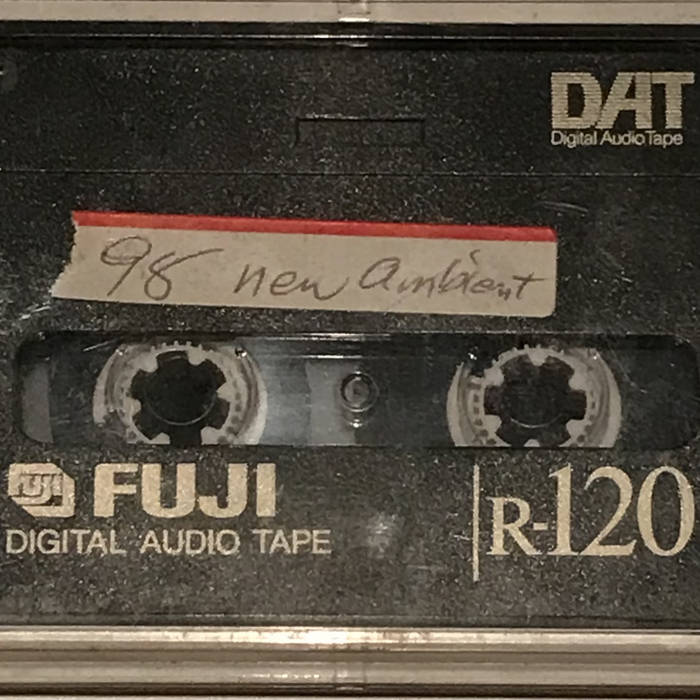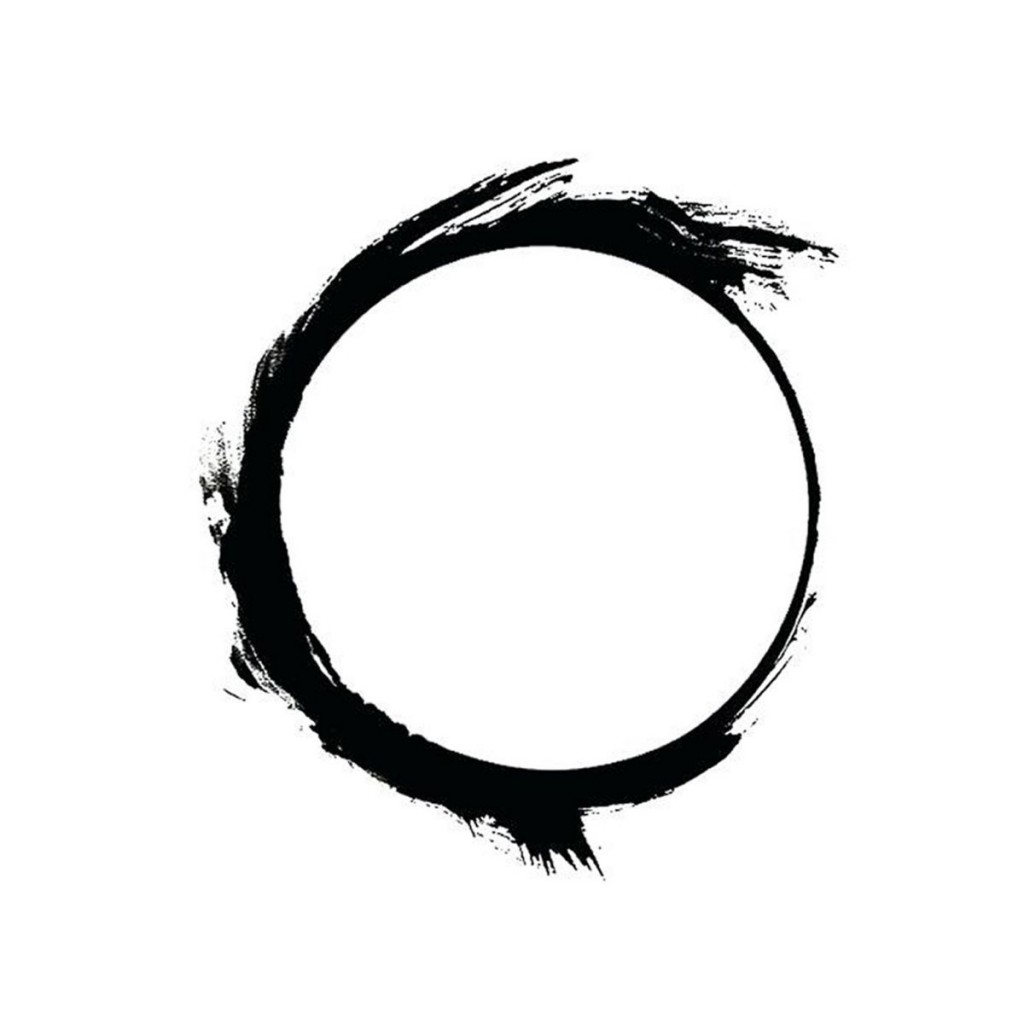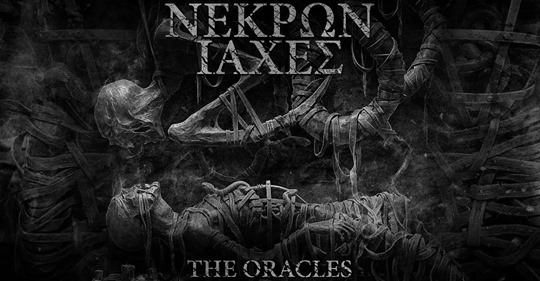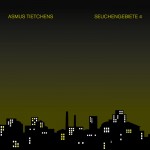 Der Hamburger Asmus Tietchens schätzt Serien, man denke etwa an die auf inzwischen sieben Teile angewachsene Mengenreihe. Auf den Alben der “Seuchengebiete”-Serie finden sich sogenannte Hydrophonien, Stücke, deren Basis das Geräusch von tropfendem Wasser ist. Der erste Teil erschien 1985, sechs Jahre später folgte Nummer zwei, 1997 auf Donna Klemms Label Artware Nummer drei. Schon in einem Interview im Jahre 2007 sprach Tietchens davon, an neuen Hydrophonien für einen vierten Teil zu arbeiten, jetzt erscheinen sechs neue Aufnahmen auf Auf Abwegen. Weiterlesen
Der Hamburger Asmus Tietchens schätzt Serien, man denke etwa an die auf inzwischen sieben Teile angewachsene Mengenreihe. Auf den Alben der “Seuchengebiete”-Serie finden sich sogenannte Hydrophonien, Stücke, deren Basis das Geräusch von tropfendem Wasser ist. Der erste Teil erschien 1985, sechs Jahre später folgte Nummer zwei, 1997 auf Donna Klemms Label Artware Nummer drei. Schon in einem Interview im Jahre 2007 sprach Tietchens davon, an neuen Hydrophonien für einen vierten Teil zu arbeiten, jetzt erscheinen sechs neue Aufnahmen auf Auf Abwegen. Weiterlesen
Archiv des Autors: Michael
REVEREND CLAIRE: Medjugorje
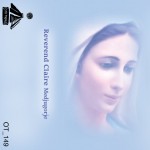 Das Projekt Reverend Claire beschäftigt sich auf „Medjugorje“ mit dem titelgebenden Ort im ehemaligen Jugoslawien (und heutigen Bosnien-Herzegowina), an dem einer Reihe Jugendlicher 1981 angeblich die Jungfrau Maria erschien. Im Gegesatz zum portugiesichen Fátima (dem sich u.a. sowohl Current 93 als auch The Legendary Pink Dots widmeten) erscheint Maria dort fast täglich oder wöchentlich. Weiterlesen
Das Projekt Reverend Claire beschäftigt sich auf „Medjugorje“ mit dem titelgebenden Ort im ehemaligen Jugoslawien (und heutigen Bosnien-Herzegowina), an dem einer Reihe Jugendlicher 1981 angeblich die Jungfrau Maria erschien. Im Gegesatz zum portugiesichen Fátima (dem sich u.a. sowohl Current 93 als auch The Legendary Pink Dots widmeten) erscheint Maria dort fast täglich oder wöchentlich. Weiterlesen
Archivaufnahmen von William Basinski: Music for Abandoned Airports: Tegel
Nach dem Doppelalbum „Lamentations“, das nicht nur auf diesen Seiten für Begeisterung sorgte – „eines der ergreifendsten Alben des Jahres 2020“, hieß es hier-, veröffentlicht William Basinski nach einem „deep dive“ in seinen Archiven Aufnahmen aus dem Jahr 1998: „Music for Abandoned Airports: Tegel“ ist, wie der Titel schon erahnen lässt, beeinflusst von Brian Eno: „someone who inspired me greatly at a tender age. Thank you Maestro.“
PONY PAYROLL BONES: Whistling the Devil to a Setting Hen
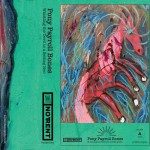 Das schon einmal als „America’s hidden gem“ titulierte äußerst skurrile Einmannprojekt ist schwer zu kategorisieren. Der Instagram-Account ist gefüllt mit zahllosen Gemälden von Vögeln und Ponies, von denen eines auch das Cover der neuesten Veröffentlichung ziert, musikalisch konnte man auf vorherigen Arbeiten u.a. dissonanate LoFi-Geigen-Experimente, Freakfolk bis hin zu einer Art Blues hören. Weiterlesen
Das schon einmal als „America’s hidden gem“ titulierte äußerst skurrile Einmannprojekt ist schwer zu kategorisieren. Der Instagram-Account ist gefüllt mit zahllosen Gemälden von Vögeln und Ponies, von denen eines auch das Cover der neuesten Veröffentlichung ziert, musikalisch konnte man auf vorherigen Arbeiten u.a. dissonanate LoFi-Geigen-Experimente, Freakfolk bis hin zu einer Art Blues hören. Weiterlesen
KJOSTAD: Warlord
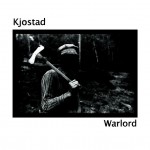 Seit über zehn Jahren veröffentlicht Stefan Aune auf seinem Label New Forces zahllose Künstler und Künstlerinnen, die eher rabiate Spielarten des Postindustrials spielen: von Power Electronics über Harsh Noise, von Incapcitants über C.C.C.C. hin zu Richard Ramirez. Aune selbst macht als Breaking The Will oder Form Hunter brachialen Noise, mit seinem Projekt Kjostad schlägt er allerdings eine (etwas) andere Richtung ein: Benannt nach dem gleichnamigen See im Norden Minnesotas, basieren die meisten Tracks auf dort gemachten Feldaufnahmen, Weiterlesen
Seit über zehn Jahren veröffentlicht Stefan Aune auf seinem Label New Forces zahllose Künstler und Künstlerinnen, die eher rabiate Spielarten des Postindustrials spielen: von Power Electronics über Harsh Noise, von Incapcitants über C.C.C.C. hin zu Richard Ramirez. Aune selbst macht als Breaking The Will oder Form Hunter brachialen Noise, mit seinem Projekt Kjostad schlägt er allerdings eine (etwas) andere Richtung ein: Benannt nach dem gleichnamigen See im Norden Minnesotas, basieren die meisten Tracks auf dort gemachten Feldaufnahmen, Weiterlesen
DET KÄTTERSKÄ FÖRBUND: Lidaverken Del I: Att I Vådeld Förgås
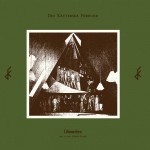 Det Kätterska Förbund ist das neue Projekt von zwei Schweden, die beide unabbhängig voneinander sehr imposante und umfangreiche Diskographien aufzuweisen haben: Henrik „Nordvargr“ Björkk hat sich in den letzten Jahrzehnten so ungefähr an allen Spielarten dunklen Postindustrials versucht (Dark Ambient, Power Electronics, Martial Industrial, Death Industrial), ob mtít seinem wohl bekanntesten Projekt MZ 412, unter seinem eigenen Namen oder zahlreichen anderen Projekttiteln, Thomas Ekelund spielt als Trepaneringsritualen Death Industrial Weiterlesen
Det Kätterska Förbund ist das neue Projekt von zwei Schweden, die beide unabbhängig voneinander sehr imposante und umfangreiche Diskographien aufzuweisen haben: Henrik „Nordvargr“ Björkk hat sich in den letzten Jahrzehnten so ungefähr an allen Spielarten dunklen Postindustrials versucht (Dark Ambient, Power Electronics, Martial Industrial, Death Industrial), ob mtít seinem wohl bekanntesten Projekt MZ 412, unter seinem eigenen Namen oder zahlreichen anderen Projekttiteln, Thomas Ekelund spielt als Trepaneringsritualen Death Industrial Weiterlesen
LUSTMORD / KARIN PARK: Alter
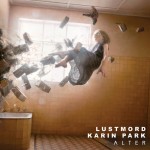 Im Werk des gebürtigen Walisers Brian Williams spielte das All immer wieder eine zentrale Rolle, teils bloß metaphorisch und/oder im Artwork, dann aber auch konzeptionell oder als Klangmaterial (man denke an das Seitenprojekt Arecibo oder das auf Touch veröffentlichte Album „Dark Matter“). In den besten Momenten (und das waren viele) konnten Williams’ dunkel dröhnende außerweltlichen Klänge ein Schaudern erzeugen , ganz so, als blicke man beim Hören in die Schwärze eines kaum (be-)greifbaren Kosmos. Weiterlesen
Im Werk des gebürtigen Walisers Brian Williams spielte das All immer wieder eine zentrale Rolle, teils bloß metaphorisch und/oder im Artwork, dann aber auch konzeptionell oder als Klangmaterial (man denke an das Seitenprojekt Arecibo oder das auf Touch veröffentlichte Album „Dark Matter“). In den besten Momenten (und das waren viele) konnten Williams’ dunkel dröhnende außerweltlichen Klänge ein Schaudern erzeugen , ganz so, als blicke man beim Hören in die Schwärze eines kaum (be-)greifbaren Kosmos. Weiterlesen
The Empty Vessel Part Two: Neues Album von Mark St. John Ellis zusammen mit Lisa Gerrard
Seit etwa drei Jahren arbeitet Mark St. John Ellis an einem neuen Projekt, das für Klangschalen, Samples, Loops und Stimme(n) konzipiert ist. Auf dem kürzlich erschienenen ersten Teil arbeitete Ellis zusammen mit der Sängerin Caitriona O’Leary, die auf frühe und traditionelle Musik spezialisiert ist. Die aus zehn Teilen bestehende Komposition wurde 2020 erstmalig in der Chapel Royal des Dublin Castle einem Publikum vorgestellt. Jetzt ist gerade eine zweite Version von “The Empty Vessel” entstanden und veröffentlicht worden, auf der Ellis von Lisa Gerrard unterstützt wird.
V.A. : Elf Dance
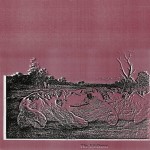 Über Mkl Drekka Anderson hieß es kürzlich auf diesen Seiten bzgl. seines enorm vielseitigen Outputs, er mache Musik, „die von an Cure und New Order erinnernden Wavepop bis zu ritueller Dronemusik, Field Recordings und krachigen Erzeugnissen reicht.“ Weiterlesen
Über Mkl Drekka Anderson hieß es kürzlich auf diesen Seiten bzgl. seines enorm vielseitigen Outputs, er mache Musik, „die von an Cure und New Order erinnernden Wavepop bis zu ritueller Dronemusik, Field Recordings und krachigen Erzeugnissen reicht.“ Weiterlesen
ITCHING: Gyre
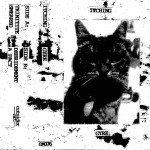 Der aus Nottingham stammende Henry Davies hat bisher bei einer Reihe Bands unterschiedlicher Genres gespielt, u.a. als Drummer bei der Sludgeband Moloch oder bei Bloody Head, die laut Selbstauskunft „broken brain blues “ spielen. Relevanter für die Betrachtung seines neuen Projekts Itching sind aber die zahleichen Veröffentlichungen, die er unter dem Namen Nacht und Nebel gemacht hat, fokussierte sich und basierte seine Geräuschmusik doch allein auf einem musikalischem Ausgangsmaterial – dem Cello. Nacht und Nebel traten u.a. mit Father Murphy auf, inzwischen ist das Projekt aber eingestellt. Weiterlesen
Der aus Nottingham stammende Henry Davies hat bisher bei einer Reihe Bands unterschiedlicher Genres gespielt, u.a. als Drummer bei der Sludgeband Moloch oder bei Bloody Head, die laut Selbstauskunft „broken brain blues “ spielen. Relevanter für die Betrachtung seines neuen Projekts Itching sind aber die zahleichen Veröffentlichungen, die er unter dem Namen Nacht und Nebel gemacht hat, fokussierte sich und basierte seine Geräuschmusik doch allein auf einem musikalischem Ausgangsmaterial – dem Cello. Nacht und Nebel traten u.a. mit Father Murphy auf, inzwischen ist das Projekt aber eingestellt. Weiterlesen
Auftritt von In Gowan Ring beim Free Folk Festival in San Francisco
Im Rahmen des San Francisco Free Folk Festival, das dieses Jahr digital am 12. Juni stattfand, gab es einen kurzen Auftritt von In Gowan Ring, auf dem B’ee von Walker Phillips und Caira Paravel (Tabernacle) unterstützt wurde.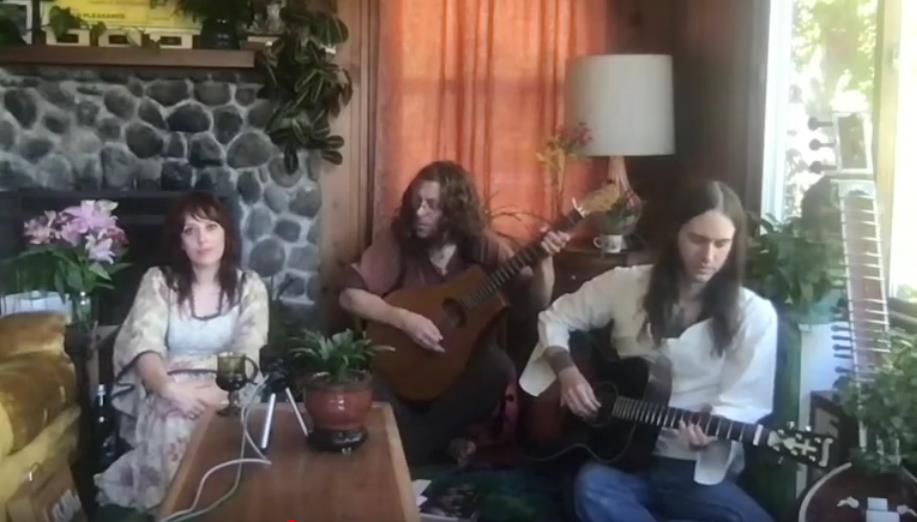 Weiterlesen
Weiterlesen
Primordial Arcana: Neues Album von Wolves In The Throne Room
Vier Jahre nach dem letzten Album „Thrice Woven“ veröffentlicht die Band aus Olympia, WA, um die beden Brüder Nathan und Aaron Weaver sowie Gitarrist Kody Keyworth mit „Primordial Arcana“ am 20. August das insgesamt siebte Album über Relapse Records in den USA und Centutury Media in Europa. Das Album wird in einer Reihe von Formaten (Vinyl, CD, Tape, DL) erhältlich sein.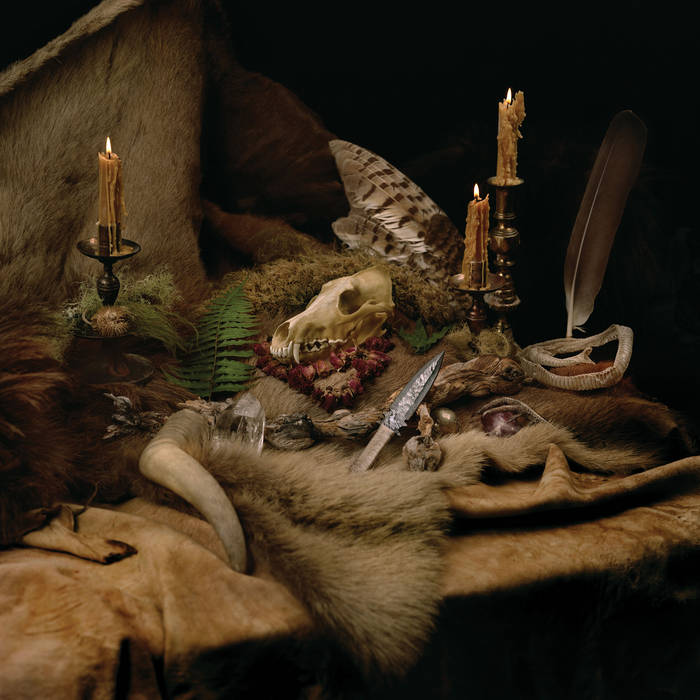 Weiterlesen
Weiterlesen
PORTAL: Hagbulbia
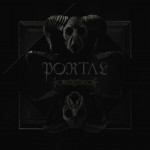 Es war schon öfter auf diesen Seiten Thema, dass in einer Zeit hypertropher Hybridisierung manche Genres besser als andere zusammenpassen. Bei „extremeren“ (wie vage und subjektiv dieses Attribut auch immer sein mag, Gewaltmusikexperte Dr. Klaus Miehling hat da sicher eine andere Einschätzung als wir) Spielarten geht Industrial oft gerne mit Black Metal zusammen. Man denke an die Drumcomputer bei Anaal Nathrark, die Black Metal-Interludien auf MZ 412s „Burning The Temple of God” oder aber an Sutekh Hexen, um nur ein paar zufällig gewählte Beispiele aus den letzten Jahrzehntehn zu nennen. Weiterlesen
Es war schon öfter auf diesen Seiten Thema, dass in einer Zeit hypertropher Hybridisierung manche Genres besser als andere zusammenpassen. Bei „extremeren“ (wie vage und subjektiv dieses Attribut auch immer sein mag, Gewaltmusikexperte Dr. Klaus Miehling hat da sicher eine andere Einschätzung als wir) Spielarten geht Industrial oft gerne mit Black Metal zusammen. Man denke an die Drumcomputer bei Anaal Nathrark, die Black Metal-Interludien auf MZ 412s „Burning The Temple of God” oder aber an Sutekh Hexen, um nur ein paar zufällig gewählte Beispiele aus den letzten Jahrzehntehn zu nennen. Weiterlesen
SUNROOF: Electronic Music Improvisations Vol. 1
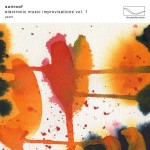 Es gibt wenige Aussagen, die weiter vom Hyperbolischen entfernt sind, als der Hinweis auf die unglaubliche Wichtigkeit von Daniel Millers Label Mute für die (nicht nur) elektronische Musik der letzten Jahrzehnte. Miller löste (scheinbare) Widersprüche auf, veröffentlichte z.B. Non+Smegmas 7” neben seiner Faketeeniepopband Silikon Teens, setzte „Music For The Masses“ neben Laibachs “Opus Dei”, um nur ein paar wenige Beispiele aus dem ersten Jahrzehnt der Labelgeschichte zu nennen. Weiterlesen
Es gibt wenige Aussagen, die weiter vom Hyperbolischen entfernt sind, als der Hinweis auf die unglaubliche Wichtigkeit von Daniel Millers Label Mute für die (nicht nur) elektronische Musik der letzten Jahrzehnte. Miller löste (scheinbare) Widersprüche auf, veröffentlichte z.B. Non+Smegmas 7” neben seiner Faketeeniepopband Silikon Teens, setzte „Music For The Masses“ neben Laibachs “Opus Dei”, um nur ein paar wenige Beispiele aus dem ersten Jahrzehnt der Labelgeschichte zu nennen. Weiterlesen
GAZELLE TWIN / NYX: Deep England
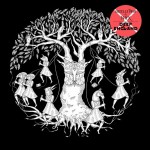 Elizabeth Bernholz ließ vor einigen Jahren auf dem Cover ihres Debüts „The Entire City“ eine Ballard’sche Welt entstehen, auf der die Pflanzen die Herrschaft über die Zivilisation übernommen hatten, auf dem Nachfolger „Unflesh“ sah man sie mit Baconartigen Gesichtsverzerrungen. Kürzlich erschien „Deep England“, ihre Reimagination und Reinterpretation – ,,an electro-choral expansion“, wie es in den Linernotes heißt – ihres Albums „Pastoral“, das zusammen mit dem NYX Electronic Drone Choir urspünglich für einen Livekontext konzipiert wurde (Bilder der Aufführung sind im Innern des Albums zu finden). Weiterlesen
Elizabeth Bernholz ließ vor einigen Jahren auf dem Cover ihres Debüts „The Entire City“ eine Ballard’sche Welt entstehen, auf der die Pflanzen die Herrschaft über die Zivilisation übernommen hatten, auf dem Nachfolger „Unflesh“ sah man sie mit Baconartigen Gesichtsverzerrungen. Kürzlich erschien „Deep England“, ihre Reimagination und Reinterpretation – ,,an electro-choral expansion“, wie es in den Linernotes heißt – ihres Albums „Pastoral“, das zusammen mit dem NYX Electronic Drone Choir urspünglich für einen Livekontext konzipiert wurde (Bilder der Aufführung sind im Innern des Albums zu finden). Weiterlesen
V.A.: All My Sins Remembered II The Sonic Worlds Of John Murphy
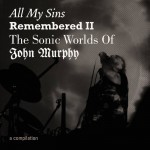 Der vor einigen Jahren verstorbene John Murphy schien oft omnipräsent, man sprach von einem „Urgestein“ des Industrials, einer „Ausnahmefigur“ und es dürfte schwer sein, all die Projekte, an denen er in irgendeiner Form beteiligt war, komplett zu überblicken. 2016 erschien auf The Epicurean der erste Teil einer (mehr als) Hommage an Murphy und sein (Lebens-)Werk: Weiterlesen
Der vor einigen Jahren verstorbene John Murphy schien oft omnipräsent, man sprach von einem „Urgestein“ des Industrials, einer „Ausnahmefigur“ und es dürfte schwer sein, all die Projekte, an denen er in irgendeiner Form beteiligt war, komplett zu überblicken. 2016 erschien auf The Epicurean der erste Teil einer (mehr als) Hommage an Murphy und sein (Lebens-)Werk: Weiterlesen
FOVEA HEX: The Salt Garden (Landscaped)
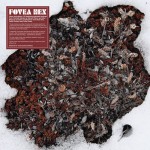 Clodagh Simonds’ Projekt Fovea Hex ist auf diesen Seiten immer wieder Thema gewesen. Bei der Besprechung ihres Albums „Home Is Where We Used To Sing“ hieß es hier: „Clodagh Simonds, in den 60ern Vokalistin bei Mellow Candle und später kurzzeitig Gastsängerin bei u.a. Thin Lizzy und Mike Oldfield, spielte mit Hilfe einer Reihe von Musikern [...], deren größter gemeinsamer Nenner die Lust am Experiment, am (Durch-)Brechen von Konventionen war Weiterlesen
Clodagh Simonds’ Projekt Fovea Hex ist auf diesen Seiten immer wieder Thema gewesen. Bei der Besprechung ihres Albums „Home Is Where We Used To Sing“ hieß es hier: „Clodagh Simonds, in den 60ern Vokalistin bei Mellow Candle und später kurzzeitig Gastsängerin bei u.a. Thin Lizzy und Mike Oldfield, spielte mit Hilfe einer Reihe von Musikern [...], deren größter gemeinsamer Nenner die Lust am Experiment, am (Durch-)Brechen von Konventionen war Weiterlesen
NEKPΩN IAXEΣ: Projekt von Andrew Liles und Sakis Tolis
Anfang Mai wird das Debütminialbum „The Oracles“ des aus Andrew Liles und Rotting Christ-Sänger Sakis Tolis bestehenden Projekts NEKPΩN IAXEΣ veröffentlicht. Die beiden werden dabei unterstützt von Melon Liles und Michael J. York, der auf dieser Veröffentlichung am Dudelsck zu hören ist und der u.a. schon Blasinstrumente bei und für Coil, Current 93, Cyclobe und Teleplasmiste gespielt hat.
TROUM: Vorbei der Tod
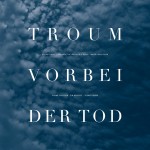 Es mag vielleicht banal und offensichtlich klingen, da es schon im Namen des Duos steckt, aber Troum haben sich im Laufe der inzwischen doch recht langen Karriere immer wieder auf Träume bezogen und ihre Arbeiten davon inspirieren lassen, so etwa vor vielen Jahren auf ihrer fantastischen „Tjukurpa“-Trilogie, die auf die Traumzeit der Aborigines verwies. Weiterlesen
Es mag vielleicht banal und offensichtlich klingen, da es schon im Namen des Duos steckt, aber Troum haben sich im Laufe der inzwischen doch recht langen Karriere immer wieder auf Träume bezogen und ihre Arbeiten davon inspirieren lassen, so etwa vor vielen Jahren auf ihrer fantastischen „Tjukurpa“-Trilogie, die auf die Traumzeit der Aborigines verwies. Weiterlesen

